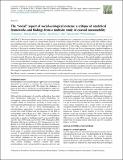The “social” aspect of social-ecological systems : a critique of analytical frameworks and findings from a multisite study of coastal sustainability
Abstract
We evaluate whether society can adequately be conceptualized as a component of social-ecological systems, given social theory and the current outputs of systems-based research. A mounting critique from the social sciences posits that resilience theory has undertheorized social entities with the concept of social-ecological systems. We trace the way that use of the term has evolved, relating to social science theory. Scientometic and network analysis provide a wide range of empirical data about the origin, growth, and use of this term in academic literature. A content analysis of papers in Ecology and Society demonstrates a marked emphasis in research on institutions, economic incentives, land use, population, social networks, and social learning. These findings are supported by a review of systems science in 18 coastal assessments. This reveals that a systems-based conceptualization tends to limit the kinds of social science research favoring quantitative couplings of social and ecological components and downplaying interpretive traditions of social research. However, the concept of social-ecological systems remains relevant because of the central insights concerning the dynamic coupling between humans and the environment, and its salient critique about the need for multidisciplinary approaches to solve real world problems, drawing on heuristic devices. The findings of this study should lead to more circumspection about whether a systems approach warrants such claims to comprehensiveness. Further methodological advances are required for interdisciplinarity. Yet there is evidence that systems approaches remain highly productive and useful for considering certain social components such as land use and hybrid ecological networks. We clarify advantages and restrictions of utilizing such a concept, and propose a reformulation that supports engagement with wider traditions of research in the social sciences.
Citation
Stojanovic , T , McNae , H , Tett , P , Potts , T W , Reis , J , Smith , H D & Dillingham , I 2016 , ' The “social” aspect of social-ecological systems : a critique of analytical frameworks and findings from a multisite study of coastal sustainability ' , Ecology and Society , vol. 21 , no. 3 , 15 . https://doi.org/10.5751/ES-08633-210315
Publication
Ecology and Society
Status
Peer reviewed
ISSN
1708-3087Type
Journal article
Description
The work described here was partly funded by the European Commission’s FP6 contract 036992.Collections
Items in the St Andrews Research Repository are protected by copyright, with all rights reserved, unless otherwise indicated.
Related items
Showing items related by title, author, creator and subject.
-
Strength in a weakened state : interpreting Hizb’allah’s experiences as a social movement and governing coalition in Lebanon 1985-2013
Bernhoff, Arthur (University of St Andrews, 2015-06-23) - ThesisThis study investigates Hizb’allah’s successful but competing dual development as an extra-institutional Shi’a social movement and an institutional political party. Hizb’allah has traditionally been studied from the ... -
Radical social innovations and the spatialities of grassroots activism : navigating pathways for tackling inequality and reinventing the commons
Apostolopoulou, Elia; Bormpoudakis, Dimitrios; Chatzipavlidis, Alexandros; Cortés Vázquez, Juan José; Florea, Ioana; Gearey, Mary; Levy, Julyan; Loginova, Julia; Ordner, James; Partridge, Tristan; Pizarro Choy, Alejandra; Rhoades, Hannibal; Symons, Kate; Veríssimo, Céline; Wahby, Noura (2022-04-05) - Journal articleIn this article, by drawing on empirical evidence from twelve case studies from nine countries from across the Global South and North, we ask how radical grassroots social innovations that are part of social movements and ... -
Wellbeing and social network characteristics in rural communities : findings from a cohort in social housing in Cornwall, United Kingdom
Long, Emily; Stevens, Sebastian; Topciu, Raluca; Williams, Andrew James; Taylor, Timothy; Morrissey, Karyn (2022-05-19) - Journal articleBackground: The mental wellbeing of those living in resource poor and rural localities is a public health priority. Despite evidence of a link between social networks and mental wellbeing, little is known about this ...

